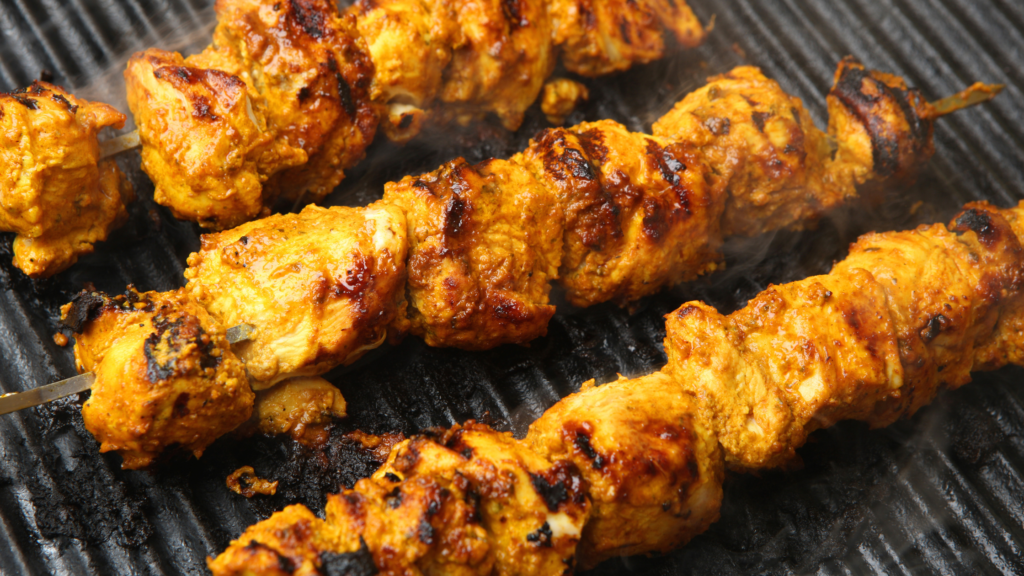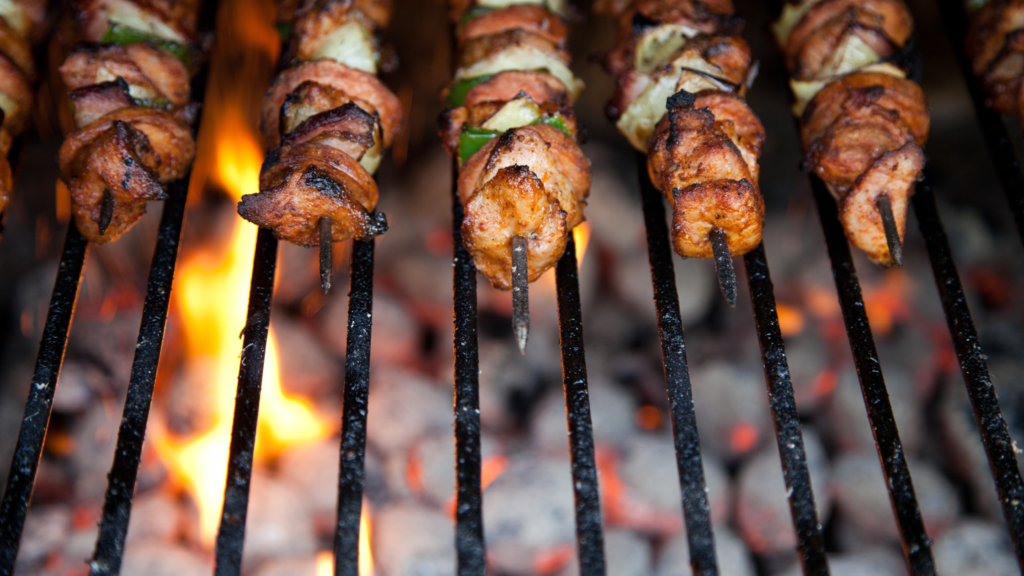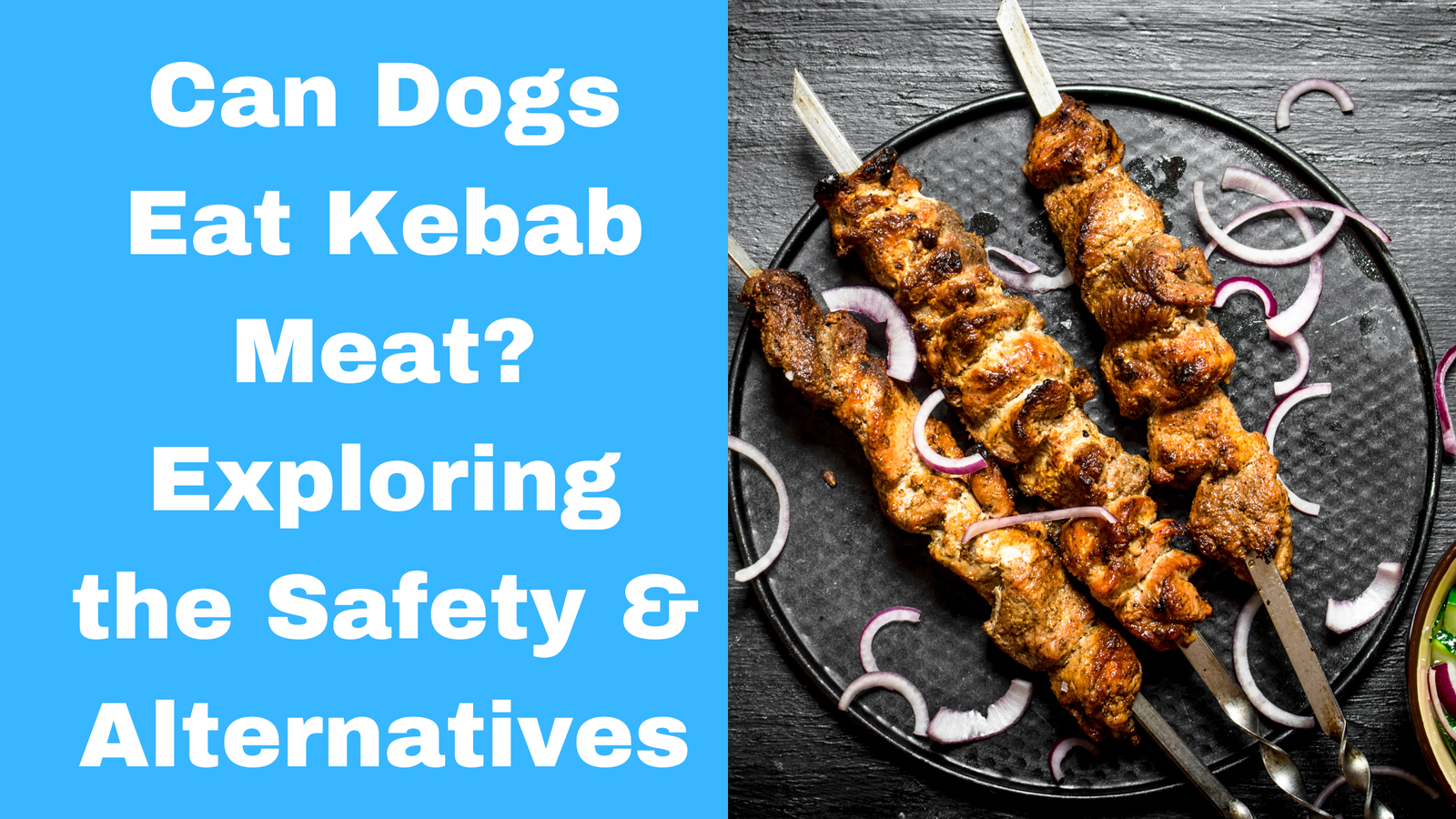When it comes to our furry friends, we want to make sure they’re eating a safe and healthy diet.
As dog owners, we may sometimes be tempted to share a tasty treat like kebab meat with our canine companions.
However, knowing the potential dangers lurking in these savoury delights is essential. In this article, we’ll explore the question: Can dogs eat kebab meat?
We’ll delve into the risks associated with feeding kebab meat to dogs and provide safe alternatives to ensure our four-legged friends stay happy and healthy.
So, let’s dive in and uncover the truth about kebab meat and our beloved canines.
Can dogs eat kebab meat?

The short answer is no; dogs should not eat kebab meat. While sharing our favourite foods with our furry companions may be tempting, it’s essential to understand the potential risks involved.
Is Kebab Meat Safe for Dogs?
Regarding the safety of kebab meat for our furry friends, we must exercise caution.
While dogs are omnivores and can enjoy a variety of foods, there are specific concerns to keep in mind when it comes to kebab meat.
One of the primary concerns is the ingredients and seasonings used in kebab meat.
Many kebab meats contain spices, marinades, or sauces that may not be suitable for canine consumption.
Ingredients like onions, garlic, or certain herbs can harm dogs.
They may cause gastrointestinal distress or even more severe health issues.
Another consideration is how the kebab meat is cooked.
Grilled or barbecued kebab meat often contains charred or fatty parts, which can be difficult for dogs to digest and may lead to pancreatitis or other digestive problems.
Therefore, it’s crucial to consider these factors before feeding your dog kebab meat.
Even if your dog gazes at you with those adorable eyes, it’s best to resist the temptation and opt for safer alternatives.
Remember, the health and well-being of our furry friends should always be our top priority.
By being mindful of the ingredients and cooking methods used in kebab meat, we can help ensure the safety and happiness of our beloved companions.
Dangers of Feeding Kebab Meat to Dogs

While kebab meat may be a delicious treat, it can pose several dangers to our canine companions.
Awareness of the specific ingredients commonly found in kebab meat that can harm dogs is essential.
One such ingredient is onions.
Onions, whether raw or cooked, contain compounds that can cause damage to a dog’s red blood cells, leading to hemolytic anaemia.
Similarly, garlic, often used in kebab meat seasonings, can also be toxic to dogs and may cause gastrointestinal irritation and potential damage to their red blood cells.
Certain spices commonly used in kebab preparations can also be problematic for dogs.
Spices like chilli powder, paprika, or cayenne pepper can irritate their digestive system and cause discomfort, diarrhoea, or vomiting.
Another concern is the high-fat content often present in kebab meat.
Excessive fat intake can lead to pancreatitis, a condition characterized by pancreas inflammation.
Dogs with pancreatitis can experience symptoms such as abdominal pain, loss of appetite, vomiting, and lethargy.
Therefore, it’s vital to recognize the potential risks associated with feeding kebab meat to dogs.
The ingredients and seasonings used in kebab meat can adversely affect their health and well-being.
To ensure the safety of your furry friend, it’s best to avoid giving them kebab meat altogether.
Instead, focus on providing them with dog-friendly, nutritionally balanced meals specifically formulated for their needs.
By being mindful of the dangers of certain ingredients and the high-fat content in kebab meat, we can protect our four-legged friends from potential health issues and ensure they enjoy a happy and healthy life.
Also Read : Can Hydroxyzine Kill Dogs? What You Should Know
Safe Alternatives to Kebab Meat for Dogs
While kebab meat may not be suitable for our furry friends, plenty of safe and delicious alternatives can satisfy their taste buds.
Let’s explore some dog-friendly options you can offer as a substitute for kebab meat.
1. Plain Cooked Chicken or Turkey
Lean meats like chicken or turkey can be a healthy and protein-rich choice for your dog.
Ensure the meat is thoroughly cooked, free from any seasonings, and without skin or bones, which can pose choking hazards.
2. Fish
Salmon or whitefish can be a nutritious alternative to kebab meat.
It’s essential to remove any bones and cook the fish thoroughly to ensure it is safe for your dog to consume.
Fish is an excellent source of omega-3 fatty acids, which promote healthy skin and coat.
3. Lean Beef or Pork
If you offer beef or pork, opt for lean cuts and ensure they are cooked thoroughly.
Trim away any visible fat before serving it to your dog.
Moderation is vital regarding fatty meats, as excessive fat intake can lead to health issues.
4. Vegetables
Dogs can also enjoy a variety of vegetables as part of their diet.
Carrots, green beans, and sweet potatoes are excellent choices.
However, ensure they are cooked or steamed to aid digestion and enhance nutrient absorption.
5. Dog-Friendly Treats
Explore the range of commercially available dog treats specifically formulated for their nutritional needs.
Look for treats made with wholesome ingredients, free from harmful additives, and tailored to meet your dog’s dietary requirements.
You can provide your dog with a balanced and nutritious diet by choosing these safe and healthy alternatives.
Remember to introduce new foods gradually, monitor their response, and consult with your veterinarian if your furry friend has any concerns or specific dietary requirements.
With these alternatives, you can offer your dog a flavorful and enjoyable meal while keeping their health and well-being in mind.
Preventing Dogs from Eating Kebab Meat

Keeping our dogs safe means taking proactive measures to prevent them from accessing or consuming kebab meat. Here are some practical tips and strategies to help you protect your furry friend:
1. Proper Supervision
Keep a close eye on your dog, especially during outdoor gatherings or picnics where kebab meat might be present.
Dogs are curious creatures whose noses can lead them to tempting treats. By actively supervising them, you can intervene if they try to snatch a bite.
2. Training and Recall
Teach your dog basic commands like “leave it” or “drop it.”
These commands can be invaluable in redirecting their attention away from potentially harmful food.
Practice these commands regularly in a controlled environment and reinforce positive behaviour with rewards.
3. Secure Food Storage
Store kebab meat and other potentially dangerous foods in secure containers or coolers out of your dog’s reach.
Dogs are skilled at finding ways to get to tasty morsels, so taking precautions with proper food storage is essential.
4. Create a Safe Space
Designate a safe and comfortable area for your dog during outdoor gatherings.
Please set up a crate or a designated space with their bed, toys, and water.
This will keep them away from potential food temptations and provide them with a familiar and secure area.
5. Educate Others
Inform your family, friends, and guests about your dog’s dietary restrictions and the potential dangers of feeding them kebab meat.
Request their cooperation in not offering any food without your permission. A little awareness goes a long way in keeping your dog safe.
Remember, dogs rely on us to make the right choices for their well-being.
By implementing these preventive measures, you can create a safer environment for your dog and enjoy outdoor gatherings without worrying about their access to kebab meat or other potentially harmful foods.
By prioritizing training, supervision, and proper food storage, you can help ensure your dog remains safe and healthy.
Enjoy your time together and provide them with alternative, dog-friendly treats to enjoy alongside you.
Also Read : Can Dogs Eat Ricotta Cheese? Best Guide – Risks and Benefits
Conclusion
Feeding kebab meat to dogs can pose significant risks to their health and well-being.
Throughout this article, we have explored the potential dangers and provided safe alternatives and preventive measures to keep our furry friends safe.
It is crucial to remember that kebab meat often contains ingredients like onions, garlic, spices, and high-fat content, which can harm dogs.
These ingredients can lead to digestive upset, pancreatitis, and even toxic effects.
As responsible dog owners, we must prioritize our pet’s health by avoiding the temptation to share kebab meat with them.
Instead, choose safe and dog-friendly alternatives, such as plain-cooked chicken or turkey.
These lean meats provide protein without the harmful seasonings and excessive fats found in kebab meat.
By choosing healthier options, we can ensure our dogs receive a balanced diet that meets their nutritional needs.
Preventing dogs from eating kebab meat requires proactive measures. Proper supervision, training, and secure food storage are essential.
Additionally, educating others about your dog’s dietary restrictions and enlisting their cooperation can help create a safer environment for your furry friend.
Always consult with your veterinarian regarding your dog’s specific dietary concerns.
They can provide guidance tailored to your dog’s needs and help you make informed decisions about their diet.
We can prioritize our dog’s health and well-being by making informed and safe choices.
Remember that our dogs rely on us to make the right decisions for their dietary needs.
Together, we can provide them with a balanced and dog-friendly diet, ensuring their happiness and longevity as cherished members of our families.
